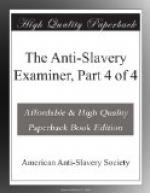While I deem it a duty to myself to take this step, I feel called on to state the reasons that influence me.
In entering upon the duties of the office in question, I complied with the requirements of the law, by taking an oath “to support the Constitution of the United States.” I regret that I ever took that oath. Had I then as maturely considered its full import, and the obligations under which it is understood, and meant to lay those who take it, as I have done since, I certainly never would have taken it, seeing, as I now do, that the Constitution of the United States contains provisions calculated and intended to foster, cherish, uphold and perpetuate slavery. It pledges the country to guard and protect the slave system so long as the slaveholding States choose to retain it. It regards the slave code as lawful in the States which enact it. Still more, “it has done that, which, until its adoption, was never before done for African slavery. It took it out of its former category of municipal law and local life, adopted it as a national institution, spread around it the broad and sufficient shield of national law, and thus gave to slavery a national existence.” Consequently, the oath to support the Constitution of the United States is a solemn promise to do that which is morally wrong; that which is a violation of the natural rights of man, and a sin in the sight of God.
I am not, in this matter, constituting myself a judge of others. I do not say that no honest man can take such an oath, and abide by it. I only say, that I would not now deliberately take it; and that, having inconsiderately taken it, I can no longer suffer it to lie upon my soul. I take back the oath, and ask you, sir, to take back the commission, which was the occasion of my taking it.
I am aware that my course in this matter is liable to be regarded as singular, if not censurable; and I must, therefore, be allowed to make a more specific statement of those provisions of the Constitution which support the enormous wrong, the heinous sin of slavery.
The very first Article of the Constitution takes slavery at once under its legislative protection, as a basis of representation in the popular branch of the National Legislature. It regards slaves under the description “of all other persons”—as of only three-fifths of the value of free persons; thus to appearance undervaluing them in comparison with freemen. But its dark and involved phraseology seems intended to blind us to the consideration, that those underrated slaves are merely a basis, not the source of representation; that by the laws of all the States where they live, they are regarded not as persons; but as things; that they are not the constituency of the representative, but his property; and that the necessary effect of this provision of the Constitution is, to take legislative power out of the hands of men, as such, and




